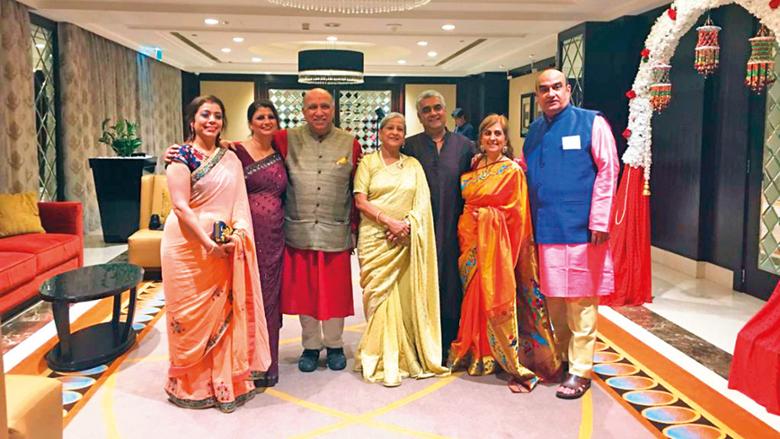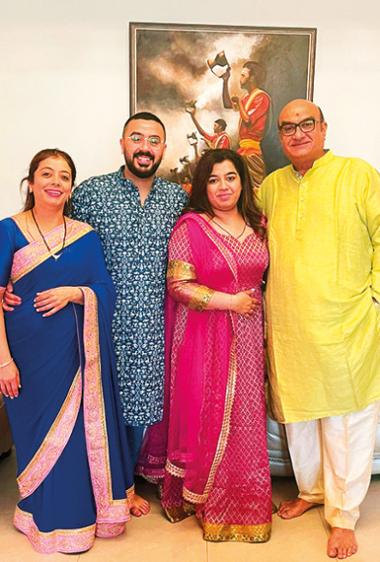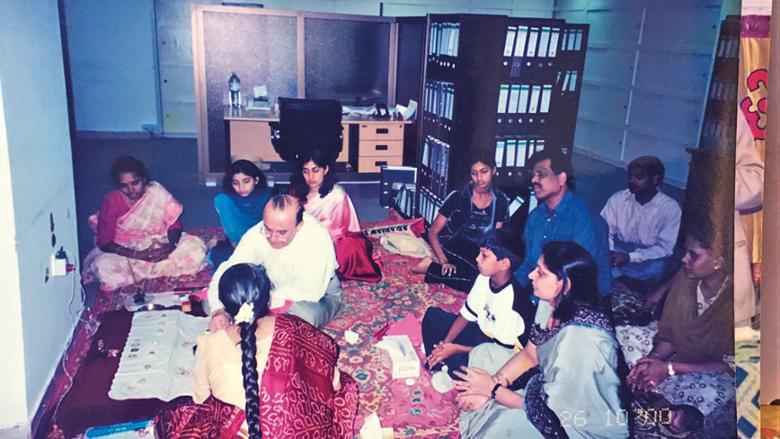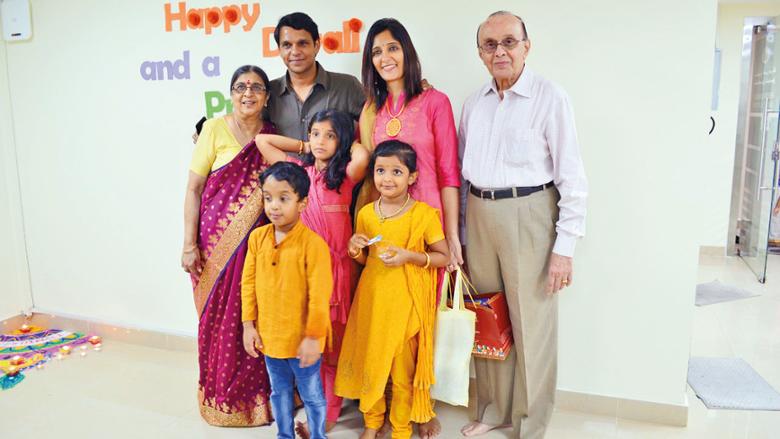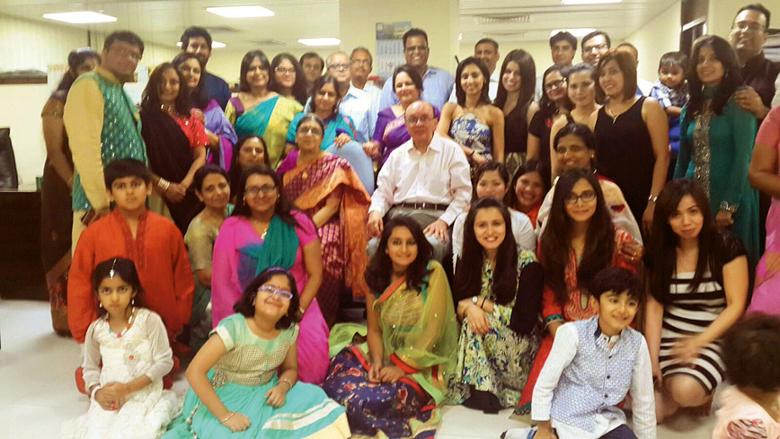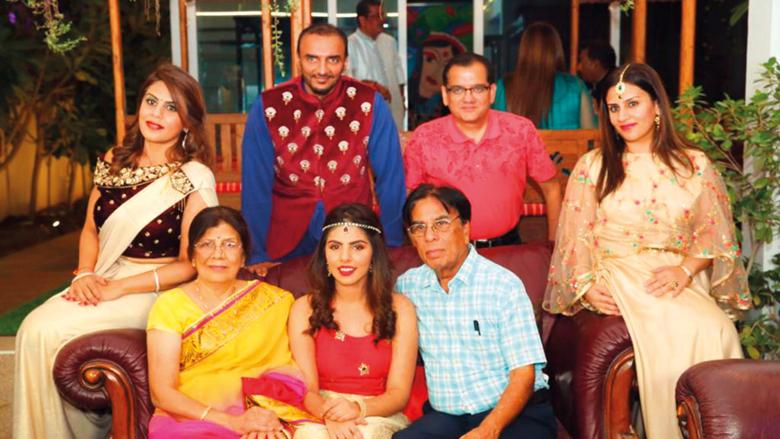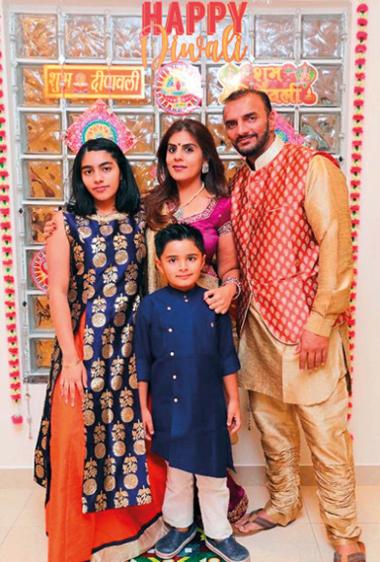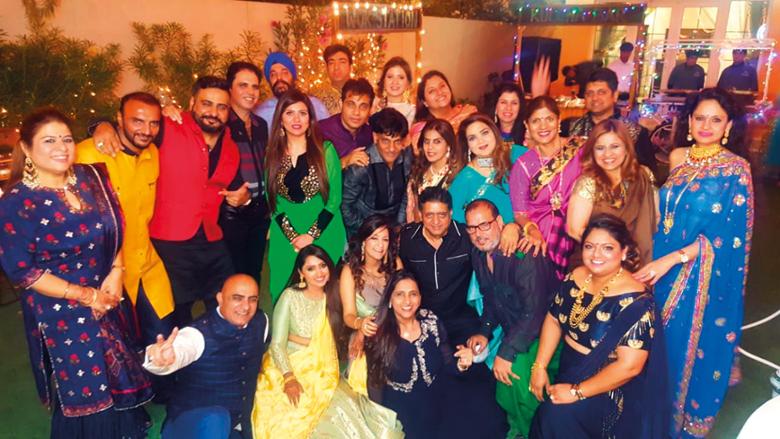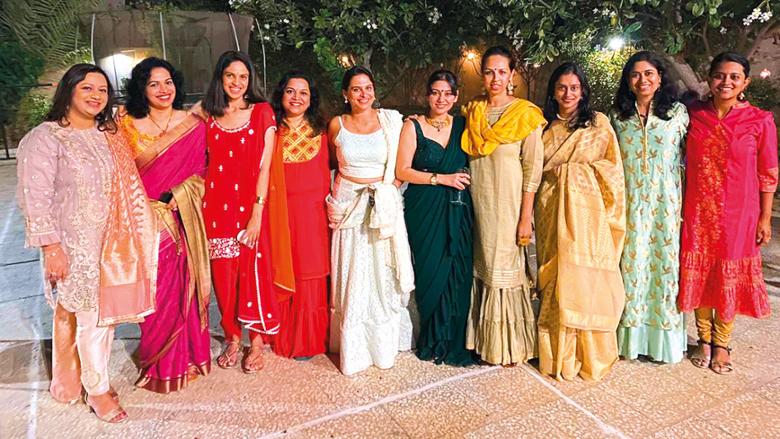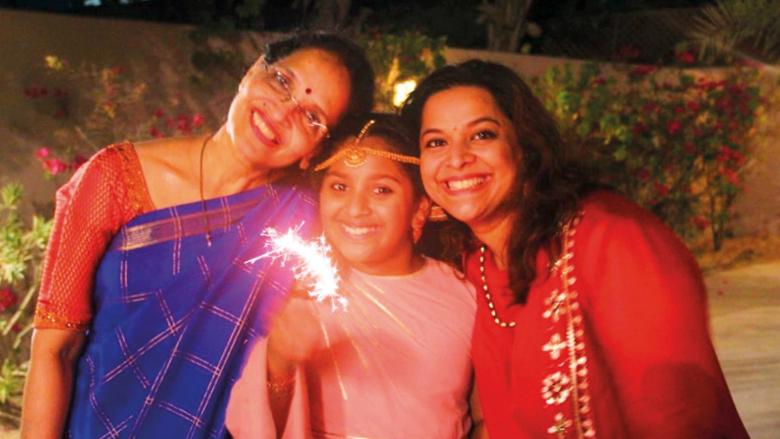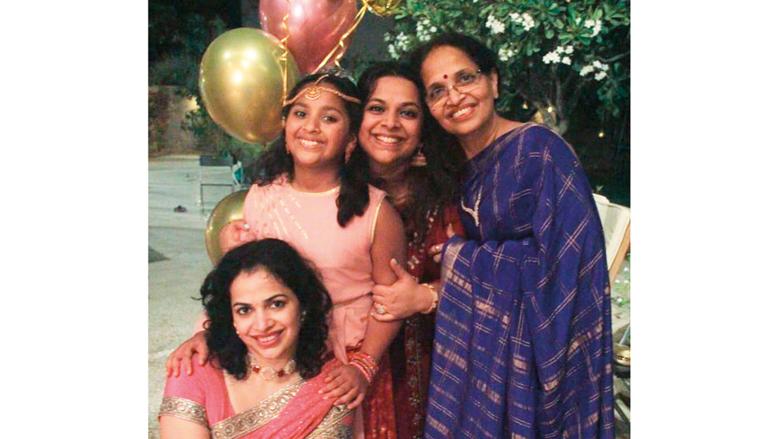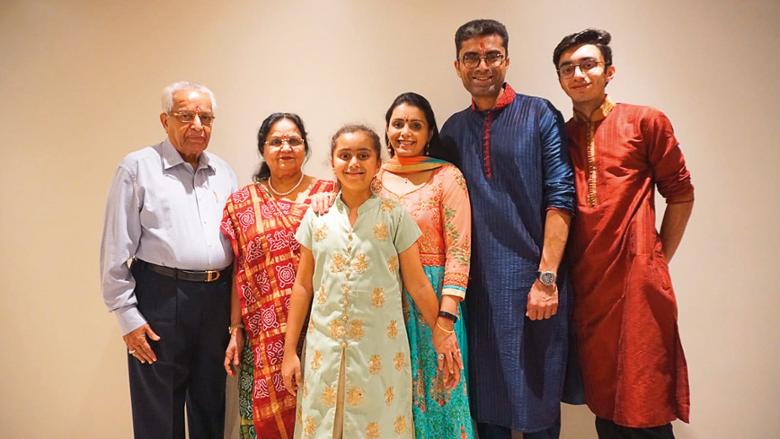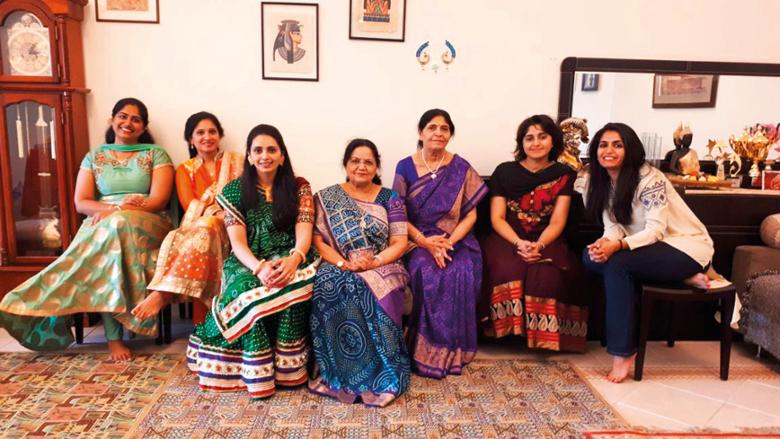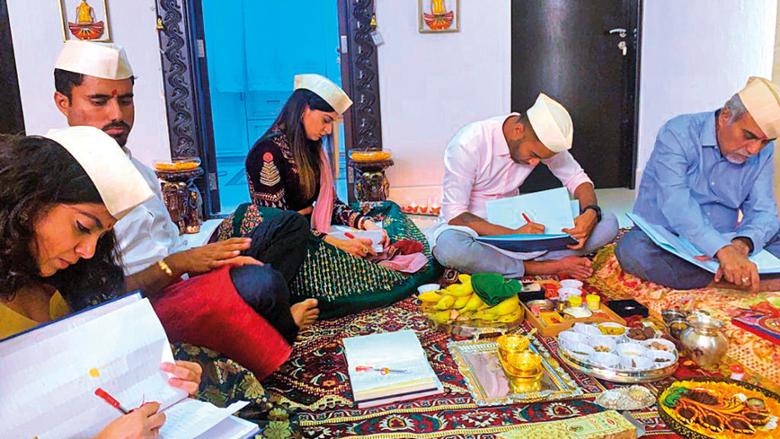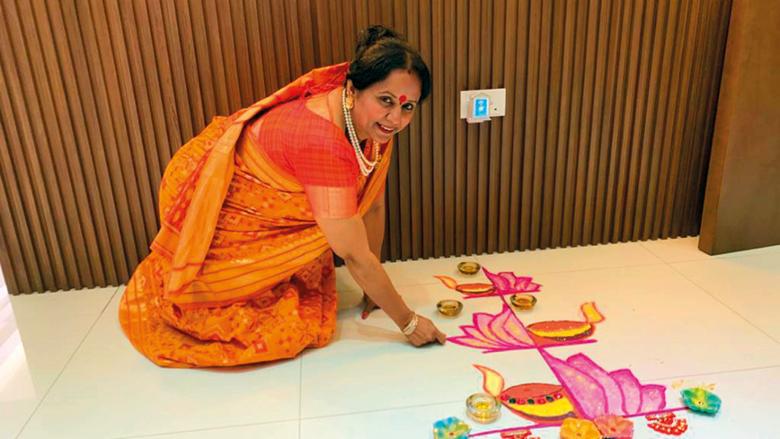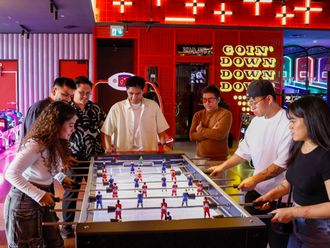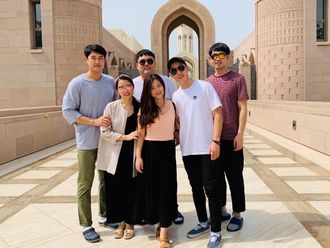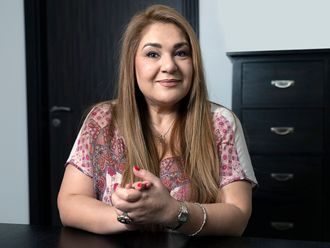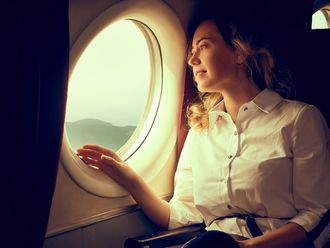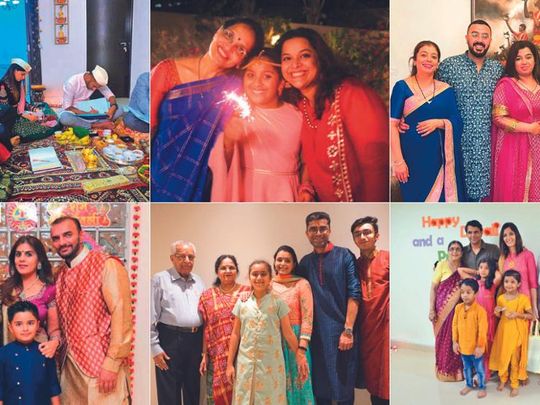
Dinesh Khiara, owner, Khiara Stores
Dinesh Khiara’s father Naraindas Khiara arrived in Dubai in 1952. "The festive feel starts with home decorations, adornments with fresh flowers and lights at the entrance and in balconies," says Dinesh, who is going to be celebrating the 37th consecutive Diwali in the UAE this year.
Every year, Dinesh says the entrance to his home is decked up with rangoli designs (decorating the floor with powder colours or flowers) and the lighting of diya (earthen lamps). These rituals are done to welcome luck and prosperity, he adds.
"Our neighbours, including a Lebanese family that lived in the opposite villa, realise Diwali is approaching when they see the lights being put up and eagerly await to receive homemade sweets from us."
Shopping for new clothes is a favourite activity for the family and it is done weeks before Diwali. "These days, our family buys readymade outfits. But earlier, we used to go to a tailor with our dad to get the clothes stitched and wore new outifts for Diwali and Roopchaudas (a day before Diwali)."
In the late 60s, his father used to invite relatives and staff home for the religious rituals and dinner.
He and his brothers continue the ritual of celebrating Diwali with staff. "We don’t invite staff (now over 50 people) home for pooja. But we ensure we have Diwali lunch together at India Club, take them on a dhow cruise and desert safari as part of Diwali celebrations, and give them a gift as well. We have also directed our children, the next generation, to continue this regardless of the staff numbers."
Dinesh says the entire family gathers for the pooja. "Friends and relatives visit us, and this goes on for almost three weeks after Diwali."
"We also call on our friends and family and also attend some open houses. There is an annual Bhatia community Diwali gathering and entertainment event that all look forward to where we meet our extended families. It’s something we missed last year due to the pandemic."
"On the New Year day, the day after Diwali, we visit the Krishna temple in Dubai where a ritual called annakut is conducted that includes offering a variety of foods to the deity. It is a sacred annual tradition that is revered by our community."
Mahendra K Asher, founder and senior partner, Mahendra Asher & Co., Chartered Accountants firm
Mahendra K Asher has lived in Dubai for over 50 years. He recalls Diwali occasions for bringing lovely memories of meeting his friends and loved ones, decorating homes with lights, diyas (lamps), and relishing delicious food.
"The primary significance of Diwali is Lakshmi pooja and chopda pujan (revering accounting books) that is done in our office with around 50 people – family and staff from different nationalities. Our Filipino teammate in fact is so fond of the festival that she wears a sari with the help of a colleague and makes it a point to wear Indian outfits for the various rituals."
Mahendra remembers life in the 1970 right until the 90s when he and several of his close friends lived in Bur Dubai. "We stayed very close to the temple and would begin the Hindu New Year – the day after Diwali – by visiting the Bur Dubai Krishna temple. It was also the meeting point for 14 of his friends and their families.
"All my friends and their families then would come to my home as I lived within walking distance from the temple, and would either spend the day together, enjoying good food and fun activities or visit all our loved ones across the UAE, including those living in Sharjah. It was a custom to visit friends and family on New Year at their home."
Although Mahendra still calls on the friends, he admits that celebrations are no longer the same intimate affair. Either the celebrations are hosted in swanky hotels or are outsourced to event management companies, with guests being a mix of family, friends, and business associates, he says. Because of which, he says, the personal touch that made celebrations unforgettable in the past is no long there.
Still, Mahendra makes it a point to meet and wish his close friends personally and celebrate the festival with his family following the traditional rituals, just so that he is able to keep the beautiful memories of the past alive.
Nisha Kisani, homemaker, supports her family business of a chain of ladies salons
Nisha Kisani’s father has lived in Dubai for over 60 years and says she has celebrated all Diwali festivals here for almost 45 years. "In my growing years in the 1980s, Diwali was when my mum would prepare festive meals and sweets; lights and diyas were placed around the house, and we would dress up in new clothes."
Visiting relatives was customary and all those who came home were served homemade delicacies. Elders would gift the children with a token gift of cash that was cherished. "Our Diwali lasted for several weeks as most of my extended family are long term Dubai residents."
Over the years, she finds the Diwali celebrations have changed. "Many households have replaced the homemade sweets and snacks with the treats readily available at local stores. But the rituals and traditional decorations remain the same, as ladies in the family make rangoli designs with colourful powder outside our front doors and decorate it with fresh flowers, and lamps and Lakshmi Puja is done with close family members."
"E-invites and WhatsApp are used to invite people at home that start weeks before Diwali. A large group of families and friends get together. Everyone is decked up in their finest traditional attire and jewellery, and outdoor catering is done with live stations serving international cuisine to the guests. Over several days and weeks, we meet with relatives and friends." If earlier gifts used to be in cash, now it is replaced by massive Diwali gift hampers containing nuts and sweets. "We have hosted about 60-80 relatives and friends at our house in pre-Covid times."
Vrata Shetty, specialist endodontist and medical director of Rex Medical Centre
Vrata Shetty grew up in Dubai as her parents have lived in this country for over 40 years. She remembers her childhood memories of Diwali as huge gatherings, eating lots of sweets, food and a lot of fun. "The joy and excitement for Diwali are much the same now as it was in my growing years."
Vrata remembers her mother starting the ritualistic Diwali cleaning of the house days in advance. "All the silverware and brass used was polished to perfection by my sister and me – albeit reluctantly. We could smell the aroma of sweets being prepared at home even before we entered the home after school days."
"We would get together with aunts and cousins and make huge quantities of crispy snacks and sweets, mainly ‘chakkulis’ (a savoury) and boondi laddoos. The hustle-bustle of Diwali shopping for clothes and jewellery used to be an emotional experience, a lot of anticipation for the new clothes that our parents selected for us."
Twinkling colourful lights used to be put up on the balconies signifying the start of the celebrations. "Having an oil bath on the morning of Diwali, we would feast on Methi dosas while my father would narrate the story behind the festival’s significance. We heard the same story every year, making it a part of the rituals.
"We always have huge gatherings at home – up to 70 guests these days. The celebrations run late into the night with friends and family filling our home with warmth and light, sharing homemade sweets, exchanging gifts and making precious memories."
"We still make a lot of sweets at home, much like we did earlier, and now it’s my daughter, son and nephews who help keep the traditions alive. My husband Mithun and I plan to celebrate Diwali this year too with our family and friends while following the social distancing norms."
Vimla Narottam Soni, homemaker, her family runs a successful jewellery business – Tejori Gems
Vimla and her husband arrived in Dubai in the 60s. She remembers the Diwali of those times as being simple celebrations with homemade treats of sweets and savoury dishes and small family gatherings as they were yet to establish themselves in the UAE.
As their family grew with a son and daughter, they wanted to pass the festive tradition to their children, making them experience all that they learned from their parents. "By the mid 70s, Dubai had become our home away from home, and Diwali became that single festival that brought all our extended family members together. The women would assemble at one house, make all the food together, and then take their share home as purchasing food from shops was not an option; everything was homemade.
"As the children grew, we started having our own Diwali pooja at our home, and we would invite our staff members for dinner after the pooja and a few close family friends. For us, Diwali pooja is a very private affair as it’s the time to invite the diety Lakshmi to our homes and bless our business.
"From the last few years, we take Diwali as an opportunity to help the less fortunate, we support multiple charities in India, and that is what makes our Diwali complete now."
Kashmira Sanganee, homemaker, family businesses include Excel Engineering and Contracting, and Designsmith Studio
Kashmira Sanganee came to Dubai post-marriage in 1985, into a joint family of 10 people who were residents of Dubai for 47 years. "Diwali celebrations in a joint family require many preparations, but the pleasant memories it creates last for life."
One of the first rituals associated with the festival was the home cleaning that begins a couple of weeks before Diwali. "I remember the elder women in the house preparing a wide variety of sweet and savouries, which were then packed and distributed among the staff," says Kashmira.
"This tradition of sharing the festive joy and food treats with colleagues and friends continues with over 350 staff members that work for us across our businesses. Every Diwali, lunch boxes, purchased from a restaurant as our employee count has risen, are given to all our staff."
Home cooking continues to be a vital part of their family tradition and festive celebrations. "We have a Diwali party at home with around 100 relatives and friends. From the welcome drink to desserts, the food served for these events is made at home.
"Lakshmi Pooja is done at home with our 15 family members, chopda pujan (revering the books of accounts) is one of the main traditions. Religious verses of prayers are written in those books as our new accounting year begins. The men in the family wear a special kind of Nehru style cap during this ritual."
"We also encourage the women in our family to write in these books in Gujrati, including the younger generation who never learned to read and write Gujrati. They have aptly learned to copy and write the text from my father-in-law’s books.
"Diwali traditions and rituals like making new rangoli (floor decorations) each day, lighting diyas (earthen lamps), and many other practices are followed that start from Ekadashi, four days before Diwali and until Bhai Dhuj, which comes two days after Diwali.
"On Dhanteras, it is auspicious to buy gold or silver, and we make sure to buy some gold or silver gifts for each member of our family.
"Even our kids have started to buy us a special gift, so it’s no longer the elders gifting the young during the festive season, but it’s also their love they express with a present. For us, it’s a seven-days of festival traditions and family cheerful times that make Diwali very special each year."



